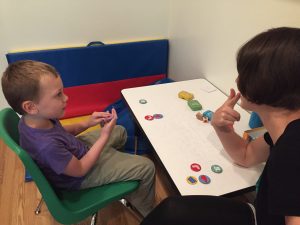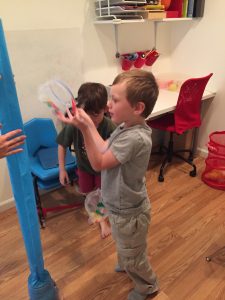What is Speech-Language Therapy?
Through play-based, child-led learning, speech-language pathologists (SLPs) help children communicate a range of wants, needs, thoughts, and ideas to those around them. Children are supported from the earliest stages of imitation and gesture to the development of increasingly complex language through problem-solving and verbal reasoning in peer interactions.
Speech-language sessions may address:
• Receptive language (language comprehension), including skills such as following directions, responding to a variety of questions, understanding a range of concepts, and processing more complex sentences and stories
• Expressive language, including using single words or gestalts (“chunks” of language), expanding sentences, building vocabulary, recalling and retelling stories, improving descriptive language, and augmenting reasoning skills across a range of communication modalities (gestures, spoken language, AAC)
• Pragmatic language, including building peer interactions, problem-solving and negotiating with others, using language to identify emotions and self-regulate, expanding play skills, and self-advocating
• Articulation and phonology
• Phonemic awareness and pre-literacy/literacy skills for all learners
• Gestural communication
• Augmentative and Alternative Communication (AAC) such as the use of dedicated communication devices, switch-based communication tools, and “low-tech” options such as core-word-based communication boards
• Cognition, including skills such as maintaining attention, improving working memory, sequencing activities, creating a plan, and flexible problem-solving
• Auditory processing
• Voice and fluency
• Feeding, both sensory-based and behaviorally-based


